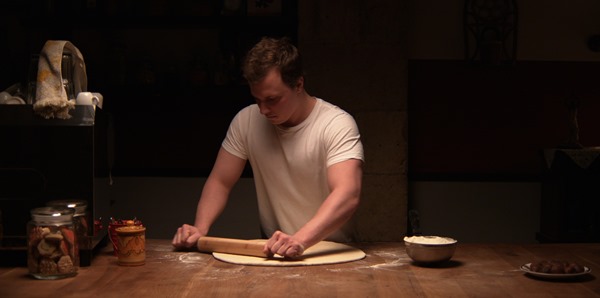Ofir Raul Graizer’s first feature film, and Israel’s submission for this year’s Best Foreign Film Academy Award, tells a complex story of love and mourning. The story begins with snapshots of the love affair between a traveling businessman, Oren (Roy Miller), and a young pastry chef, Thomas (Tim Kalkhof), with whom he stays when he travels to Berlin for work once a month. In a fast succession of short scenes, we see the first time they meet and the first time they kiss. When the two are next seen having breakfast in Thomas’s kitchen, this relationship has presumably been going on quite a while. Oren, however, is still married and has a young son back in Israel. Thomas does not pressure Oren, and the two seem to be perfectly satisfied having this incremental relationship. In fact, Thomas seems to enjoy listening to Oren talk about his family.
When Oren flies back to Israel, Thomas doesn’t hear from him for six weeks, and Oren doesn’t show up to their next scheduled rendezvous. Something is up, so Thomas heads to Israel in search of answers, and he discovers Oren died in a car crash. Now Thomas is left in Israel alone and mourning. Their relationship was a secret, so Thomas has no one to turn to, so he pays a visit to Oren’s wife, Anat (Sarah Adler), at her charming yet struggling kosher cafe. Under the guise of a foreign student, Thomas takes a job as a dishwasher in the cafe. It’s unclear if he has any motivations besides being deeply in mourning when he becomes entangled in the lives of Oren’s family.
Before long his pastry chef instincts kick in, and he starts pinching ingredients Anat has lying around to make cookies and serves them complimentary with orders for coffee. Anat’s brother-in-law, Moti (Zohar Strauss), who is a landlord and prominent member in the local religious community, immediately has a beef with Anat hiring a German, and he criticizes her for serving Thomas’s increasingly popular pastries. Because of the unsupervised use of the oven, Moti adamantly believes the cookies are not kosher. Anat, who is not religious, still needs the kosher certificate to draw customers, but she also loves Thomas’s pastries and thinks they should be shared with the world (not to mention business is booming).
Graizer’s film is light-to-medium on dialogue. There are a lot of quiet pauses, and the camera focuses on the emotions the characters are feeling (not to mention a lot of pastry porn, for those titillated by the film’s title). The acting is minimalistic, and Adler is the real standout here. Her Anat is distraught yet determined to make life work without her husband. She’s hipper than most in her Orthodox community, she’s even pretty funny and surprisingly amorous in her state of grief. As Anat starts to find out more about Thomas’s enigmatic background, the film could have veered into thriller territory, but instead Graizer’s film keeps a level head about its seemingly real-world characters.
The subplot of the kosher certification is represented by Moti, the brother-in-law, who is mostly portrayed as a one-dimensional character. The certificate acts as a metaphor about how life can at times be too complicated for rigid rules. Thomas and Oren had an unconventional love affair, and tradition would dictate that Oren should leave his family and his religion behind if he wanted to have a life with Thomas. But The Cakemaker slyly asks, is there some way for Anat, Oren, and Thomas to still carry on together?

















Leave A Comment